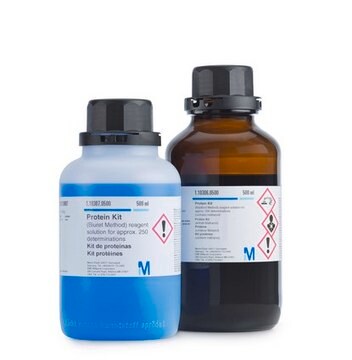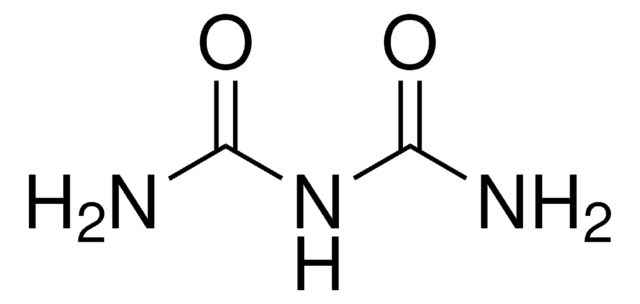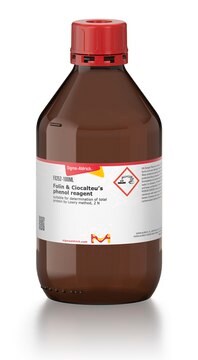T1949
Total Protein Reagent
Synonym(s):
Biuret Reagent
Sign Into View Organizational & Contract Pricing
All Photos(1)
About This Item
UNSPSC Code:
12352202
NACRES:
NC.07
Recommended Products
Quality Level
Application
Total Protein Reagent can be used for the quantitative, colorimetric determination of total protein concentration in solution at 540 nm. The total protein reagent is supplied as a ready-to-use liquid.
Total Protein Reagent has been used in the biuret assay.
Biochem/physiol Actions
A biuret-based total protein reagent. Copper ions in the alkaline reagent react with peptide bonds in proteins resulting in a purple color with an absorbance maximum of 540 nm.
Signal Word
Danger
Hazard Statements
Precautionary Statements
Hazard Classifications
Aquatic Chronic 2 - Eye Dam. 1 - Met. Corr. 1 - Skin Corr. 1B
Storage Class Code
8B - Non-combustible corrosive hazardous materials
WGK
WGK 2
Flash Point(F)
Not applicable
Flash Point(C)
Not applicable
Personal Protective Equipment
dust mask type N95 (US), Eyeshields, Gloves
Certificates of Analysis (COA)
Search for Certificates of Analysis (COA) by entering the products Lot/Batch Number. Lot and Batch Numbers can be found on a product’s label following the words ‘Lot’ or ‘Batch’.
Already Own This Product?
Find documentation for the products that you have recently purchased in the Document Library.
Customers Also Viewed
Systematic comparisons of various spectrophotometric and colorimetric methods to measure concentrations of protein, peptide and amino acid: detectable limits, linear dynamic ranges, interferences, practicality and unit costs.
Chutipongtanate S
Talanta, 98, 123-123 (2012)
Does Exurban Housing Development Affect the Physiological Condition of Forest-Breeding Songbirds? A Case Study of Ovenbirds (Seiurus aurocapillus) in the Largest Protected Area in the Contiguous United States.
Seewagen CL
Physiological and Biochemical Zoology : Pbz, 88, 416-424 (2015)
Determination of serum proteins by means of the biuret reagent.
Gornall, A. G., et al.,
The Journal of Biological Chemistry, 177, 759-759 (1949)
B T Doumas et al.
Clinical chemistry, 27(10), 1642-1650 (1981-10-01)
We developed a candidate Reference Method for measuring total serum protein by use of the biuret reaction. The method involves a previously described biuret reagent (Clin. Chem. 21: 1159, 1975) and Standard Reference Material (SRM) 927 bovine albumin (National Bureau
Claudia Einer et al.
Cellular and molecular gastroenterology and hepatology, 7(3), 571-596 (2018-12-27)
In Wilson disease, ATP7B mutations impair copper excretion into bile. Hepatic copper accumulation may induce mild to moderate chronic liver damage or even acute liver failure. Etiologic factors for this heterogeneous phenotype remain enigmatic. Liver steatosis is a frequent finding
Our team of scientists has experience in all areas of research including Life Science, Material Science, Chemical Synthesis, Chromatography, Analytical and many others.
Contact Technical Service










